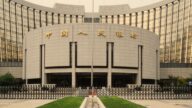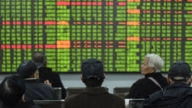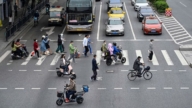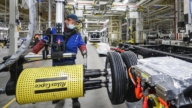【新唐人2014年04月21日讯】中国经济持续下滑令世界担忧。日前,“国际货币基金组织(IMF)”警告,中国经济将面临“硬着陆”风险。而中共官员表示,为阻止经济下滑及更大风险,已做好忍痛“割肉”的准备。那么,“割肉”能避免中国政治、经济风险吗?来听听专家的分析。
美国《华尔街日报》16号报导,中国第一季度“国内生产总值(GDP)”同比增幅,从去年第四季度的7.7%回落到7.4%,这是2012年9月以来的最低水平。
报导引述澳大利亚“澳新银行”大中华区首席经济师刘利刚的话表示,为调控市场预期,中共国家统计局可能稍微夸大了GDP数据,但实际上,中国经济已经大幅放缓。
12号,在美国华盛顿召开的“国际货币基金组织(IMF)”和“世界银行(World Bank)”春季会议上,中共财政部副部长朱光耀接受采访时承认,中国面临经济放缓的挑战,而为了克服中国经济眼前面临的难关,当局已经做好短期剧痛准备。这一说法,被专家解读为“割肉”的准备。
美国南卡罗莱纳大学艾肯商学院教授谢田:“这个是很有趣的一个说法,但是我们并不知道它(中共)这个肉具体指的哪一部分。实质上我们看,中国经济在过去六十年,尤其最近二十年,实际上就是一个割肉的过程,是中共特权和权贵阶层在割中国老百姓的肉。”
美国“南卡罗莱纳大学艾肯商学院”教授谢田表示,中国现状是“国进民退”、“国富民穷”,老百姓的收入,没有跟上中国经济所谓发展的速度,反而,中共既得利益集团、“太子党集团”和中共高层官员,却拿到不属于他们的那些肥肉和财富。
朱光耀还表示,中国经济面临多方面风险,包括“工业生产者价格指数(PPI)”已经连续第25个月下跌﹔银行系统外发行的、未受监管的信贷规模大增﹔以及截至去年6月规模达人民币17万9000亿元的地方政府债务,其中超过三分之一的债务须在今年偿还。
不少经济学家认为,中共当局需要迅速采取行动,来让经济摆脱信贷过度膨胀、过度投资和产能过剩局面。
经济专家们还担心,中国经济的增速放缓以及物价下跌,可能引发新一轮企业破产潮,甚至导致金融危机的出现。信贷迅猛增长,已经使得中国债务规模,接近国内生产总值(GDP)的两倍。
“国际货币基金组织IMF”亚太区副主管兼中国工作组负责人罗德劳尔(MarkusRodlauer)认为,中国经济面临的风险并不在于经济增长放缓,而是在于经济增长不被允许放缓。
IMF总裁拉加德也曾公开表示,中国可能因资产素质欠佳,而面临经济“硬着陆”风险。
谢田:“从这个中国国内的这些企业的倒闭潮、老板卷款外逃和产能过剩、通货膨胀,和所有这些房地产泡沫开始破灭,所以这一些经济及金融的迹象来看,中国经济的硬着陆,我觉得可能已在进行式之中了。”
谢田表示,目前外界对中国经济的诸多揣测和说法,是因为中国经济的真相还没有被世人和国际社会所熟知。
日前,中共为了继续让中国经济长期增长,进行了一系列的所谓“改革”,包括:放开利率、放开资本账户、增收房产税。但《华尔街日报》认为,这样做可能适得其反,会成为点燃大火的火柴。
谢田表示,开放利率,首先得开放银行业,以及开放对金融业的控制﹔开放资本账户,必须开放汇率,准许资本自由流动,这两者,中共不敢,也不可能做到。
谢田:“增收房地产税,实际上本来就荒唐,中国老百姓连房地产的拥有、都不是拥有者,中国人买的房子只是出的租金,租户是不需要交房产税的。”
谢田说,中国的房地产价格已经被政府炒房、炒地给哄抬的过高了,如果到时再增加房地产税,可能引起既得利益者的反弹,那老百姓更要起义造反了。
谢田表示,中国的老百姓已经被房价、医疗及教育盘剥的只剩骨头了,再也没有什么可以割的了。而眼下的“割肉”,只能表示中共的内斗已从政治上扩展到经济上,并且在全面的升级、恶化,最终将加速中共整体的瓦解。
采访编辑/易如 后制/后制/周天
Chinese Communist Party Ready to Endure Short Term Economic Pains
Further declines in China’s economy has
continued to concern the international community.
Recently, the International Monetary Fund (IMF) warned
that China’s economy is likely to face a hard landing.
Chinese officials said they are ready to endure short-term
pain in order to prevent economic downturn and bigger risks.
So, will giving way avoid political and economic
risks in China? Let’s listen to expert analysis.
On April 16, the Wall Street Journal reported
that the increase of China gross domestic
product (GDP) in the first quarter is down to
7.4% from 7.7% in the fourth quarter of last year.
This is the lowest level since September 2012.
Liu Ligang, Chief Economist at Australia & New Zealand
Banking Group Ltd, said that the CCP National Statistic
Bureau might have slightly exaggerated it’s GDP.
It did so in order to regulate market expectation.
However, China’s economy has significantly slowed.
On April 12, in the IMF and World Bank Spring
meeting in Washington, Vice Finance Minister
Zhu Guangyao admitted in an interview that China
is facing the challenge of an economic slowdown.
The authorities are prepared to endure short-term
economic pains to overcome the difficulties.
This statement was interpreted
as ready “to lose some benefits”.
Professor Frank Xie, School of Business, University
of South Carolina Aiken: “It is very interesting although
we don’t know what benefits the CCP specifically refers to.
In the past sixty years, especially the last two decades, the
Chinese economy has been in a process of losing benefits.
This is the privilege class taking advantage of the entire
Chinese populace. It is the people losing the benefits.”
Professor Xie says that China is in a situation
where the state is placed ahead of the people.
In other words, a wealthy state, but poor people.
People’s income doesn’t match with
apparent economic developments.
However, vested interest groups, princelings and senior
CCP officials receive wealth that does not belong to them.
Zhu Guangyao also said that China’s producer-price index
has had it’s twenty fifth consecutive month of decline.
Beijing is working to clean up an explosion of
unregulated credit issued outside the banking system.
This includes 17.9 trillion yuan in debts
owed by local governments as of last June.
More than a third of these debts must
be repaid this year, reported WSJ.
Many economists believe that the Chinese regime
needs to move quickly, in order to wean its economy from
runaway credit, over-investment and excess capacity.
The WSJ added that analysts worry that slowing
growth and falling prices could touch off a wave
of bankruptcies and even a financial crisis.
Booming credit growth has swollen
debt in China to roughly double the GDP.
“The risk is not slower growth,” said Markus Rodlauer,
the Deputy Director of the IMF’s Asia and Pacific
Department, and Head of IMF’s China mission.
“The risk is that growth is not allowed to slow.”
IMF Managing Director Christine Lagarde warned of
the risk of what she termed a “hard landing" in China.
Professor Xie: “I believe China’s economic
hard landing is already in progress.
This is based on economic and financial indicators,
including; the closure of domestic enterprises; owners
fleeing overseas with money; excess capacity; inflation;
and the beginning of the real estate bubble burst.”
Professor Xie also indicates that many speculations
and arguments on China’s economy have raised on being
misled by not knowing the true economic situation in China.
Recently, the CCP implemented a series of what
it called reforms, for long-term economic growth.
This would include free interest rates, the liberalization
of capital accounts, and property tax increases.
But Wall Street Journal believes doing so
may become matches to ignite a big fire.
Frank Xie indicates that free interest rate need to cut lose the
control on bank and financial industry; the liberalization of
capital account should open exchange rate to allow free capital
flows. However, the CCP dare not and will not do either one.
Professor Xie: “Property tax increases are in fact ridiculous.
None of the Chinese people are owners of property;
their house purchase are actually the retinal fee of the
land and landlords don’t need to pay property tax.”
Professor Xie says that China’s real estate prices
have been driven up too high by the regime.
The increases of property tax may trigger the vested
interests group’s to rebound, and the people will rebel.
Professor Xie explains that the Chinese people have been
exploited by the cost of housing, health care and education.
There is nothing left.
Now, the CCP’s short-term economic loss is an indication
that infighting has extended from politics to economics.
It is in an accelerated and worsening situation
nationwide. It signals the potential collapse of the CCP.
Interview & Edit/Yiru Post-Production/Zhoutian

























